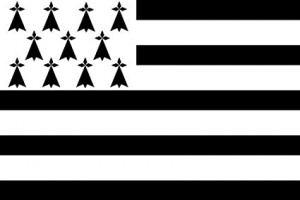Language/Breton/Grammar/Pronouns
Hi Breton learners! 😊
In this lesson, we will be discussing pronouns in Breton. Pronouns are words that take the place of nouns in sentences, simplifying the language and allowing speakers to refer to people, things or ideas without having to repeat the same nouns over and over again.
Consider exploring these related pages after completing this lesson: Personal Pronouns, How to Use "Be", Conditional Mood & Adjectives.
Personal Pronouns[edit | edit source]
Let's start with personal pronouns. Personal pronouns refer to people and things in the place of their names. In Breton, personal pronouns change depending on whether they are the subject, direct object or indirect object of the sentence. Here's a table of personal pronouns in Breton:
| Breton | Pronunciation | English |
|---|---|---|
| Me | [me] | I / me |
| Te | [te] | You (singular) |
| Emañ | [ˈemaːɲ] | (S)he is |
| Ni | [ni] | We / us (excluding the person being spoken to) |
| C'hwi | [xy] | You (plural) |
| O-deus | [oˈdeːw] | They have (regardless of gender) |
| O-deus | [oˈdeo̯sː] | They have (feminine) |
| O-deus | [oˈdeː] | They have (masculine) |
Here's an example dialogue to help illustrate the use of personal pronouns:
- Gwen: Salut ! (Hi!)
- Yann: Salut Gwen. Comment ça va ? (Hi Gwen. How are you?)
- Gwen: Très bien, et toi ? (Very good, and you?)
- Yann: Ça va, merci. Tu parles breton ? (I'm good, thank you. Do you speak Breton?)
- Gwen: Oui, je parle breton. Et toi, tu parles breton ? (Yes, I speak Breton. And you, do you speak Breton?)
- Yann: Non, je ne parle pas breton. (No, I don't speak Breton.')
In this dialogue, we can see personal pronouns being used in context, such as "tu" (you singular) and "je" (I).
Demonstrative Pronouns[edit | edit source]
Demonstrative pronouns are used to point to something specific or to distinguish it from other things. In Breton, there are two types of demonstrative pronouns: "sett" for items that are close to the speaker, and "kaset" for those that are farther away. Here's a table of demonstrative pronouns in Breton:
| Breton | Pronunciation | English |
|---|---|---|
| Setu | [ˈsetʉ] | Here it is |
| Seti | [ˈseti] | Here they are (feminine) |
| Setu-me | [ˌsetʉ ˈme] | Here I am |
| Kaset | [ˈka.se̞t] | Over there (masculine), that (masculine) |
| Kaseti | [ˈkase̞ti] | Over there (feminine), that (feminine) |
Here's an example dialogue to help illustrate the use of demonstrative pronouns:
- Anna: Setu va daoulagad ! (Here are my glasses!)
- Jean-Baptiste: Setu-me va skolioù ! (Here are my schools!)
In this dialogue, Anna and Jean-Baptiste are using "setu" and "setu-me" to refer to the immediate things surrounding them.
Possessive Pronouns[edit | edit source]
Possessive pronouns are used to show ownership or possession of an item. In Breton, possessive pronouns are very similar to personal pronouns. Here's a table of possessive pronouns in Breton:
| Breton | Pronunciation | English |
|---|---|---|
| Va | [va] | My |
| Dit | [dit] | Your (singular) |
| Eus | [øs] | His / hers / its |
| Hon | [hõw] | Our (excluding the person being spoken to) |
| Ho | [ho] | Your (plural) |
| O | [o] | Their |
Here's an example dialogue to help illustrate the use of possessive pronouns:
- Morgane: C'hoazh ezhomm zo o chom e Pariz (We are still living in Paris)
- Mathurin: Amañ eus va zont — kuit da lavarit out /aˈmãɲ es ˈva zõnt — kwit da ˈlavɑritt ut/ (Here is my future home — quit to say your opinion)
In this dialogue, Morgane and Mathurin are using "eus" and "va" respectively to show which item is theirs.
Interrogative Pronouns[edit | edit source]
Interrogative pronouns are used to ask questions about someone or something. In Breton, several interrogative pronouns are used. Here's a table of interrogative pronouns in Breton:
| Breton | Pronunciation | English |
|---|---|---|
| Pe | [pe] | What |
| Piv | [ˈpiːu̯] | Who |
| Petra eo | [ˌpɛtra ˈjo] | What is |
| Pelec'h | [peˈleχ] | Where |
| Penaos | [peˈnaws] | How |
| Peggy | [ˈpeɡi] | Why |
Here's an example dialogue to help illustrate the use of interrogative pronouns:
- Gwen: Piv zo ar re ? (Who are they?)
- Yann: Ar re-se a zo va frenn : Rémi, Katell, Paol ha Anna. (Those are my friends: Rémi, Katell, Paol and Anna.')
In this dialogue, Gwen is using "piv" to ask Yann about the people they are seeing.
Now that you know the different types of pronouns in Breton, try using them in sentences with native speakers. To improve your Breton Grammar, you can also use the Polyglot Club website. Find native speakers and ask them any questions!
➡ If you have any questions, please ask them in the comments section below.
➡ Feel free to edit this wiki page if you think it can be improved. 😎
Sources[edit | edit source]
Other Lessons[edit | edit source]
- Personal Pronouns
- Conditional Mood
- Negation
- Future Tense
- How to Use Be
- How to Use Have
- Adjectives
- Plurals
- Give your Opinion
- Gender

